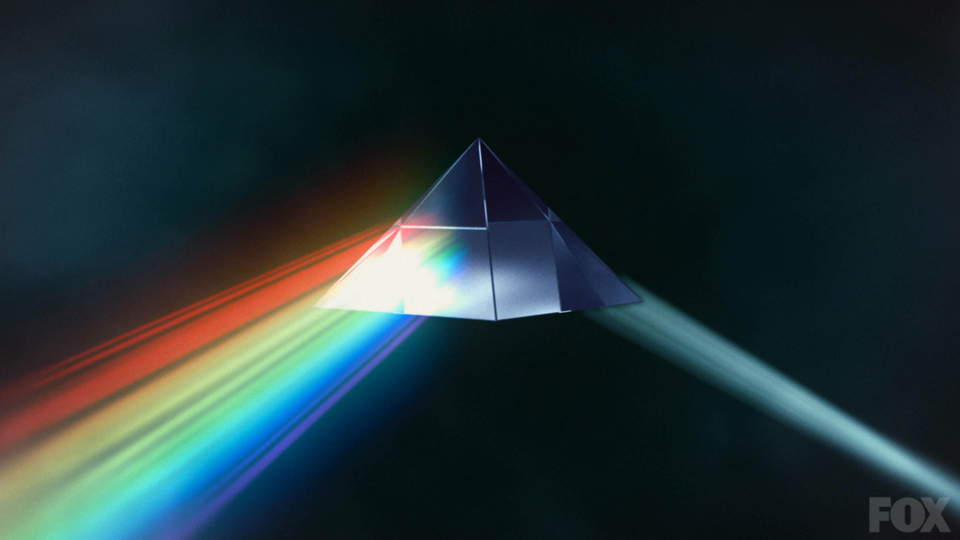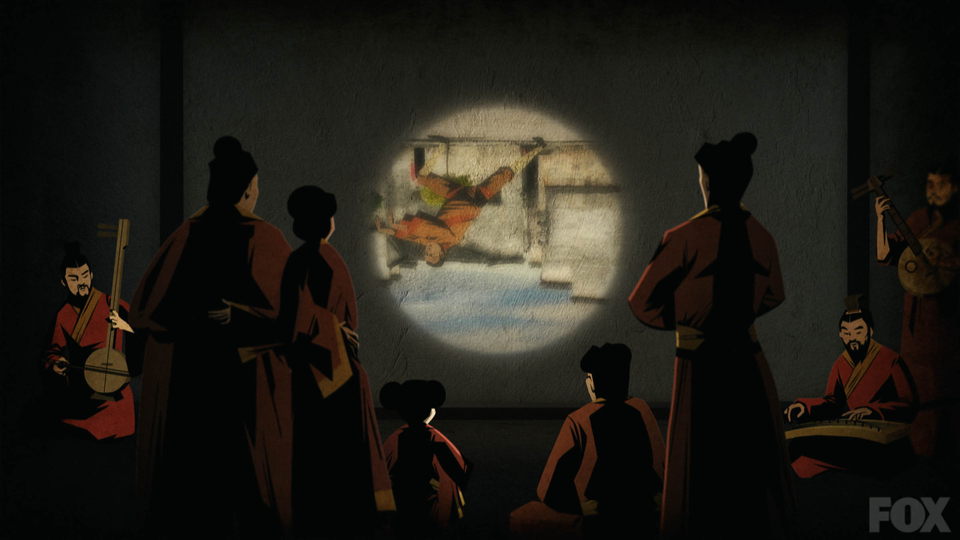 |
| Pink Floyd's major contribution to popular science knowledge. (cosmosontv.com) |
We'll get to the power of science stuff shortly, but the other thread in this episode was pointing out early steps towards a modern scientific method, the only approach to knowledge that doubts even itself while still leading us to all the mind-warping conclusions that we've been hearing about for the past few weeks. One of the main themes of the show is the fragility of free thought. We've seen fantastic ideas and questions silenced by authorities selfishly preserving their own power from doubt and inquiry, and this week we saw how an act of kindness and the gift of an education lead to huge technological leaps for a different-minded king.
Nitpicks
This week's nitpick is hard for me because it's such a common one that I am willing to bet that the writers made a decision to animate atoms the way they did for clarity - But that's why they're called nitpicks, damn it!
Unfortunately, the stills from the episode do not include an image of the cosmos atomic model, but this should look familiar:
 |
| Not what an atom looks like. (wiki) |
The tiny solar system view of the atom is called the Bohr model (after Niels Bohr, who was a cool dude you should absolutely check out on wikipedia). It was a good first guess as to what was going on at the atomic level because the electric attractive force between the positively-charged nucleus and the negatively-charged electrons has the same mathematical form as the law of gravity, but as we continued investigating, we found a much better fit from the solutions to Schrodinger's equation, which is the fundamental underpinning of modern quantum mechanics.
Schrodinger's equation has some mathematical heavy-lifting which is beyond the scope of some guy on the Internet reviewing an episode of cosmos, but basically it gives us a way to compute something called the wave function of a quantum system, which acts in many ways like a formula for calculating the probability of finding a system in a given configuration. In the case of the hydrogen atom we saw in the episode, the wave function tells us (among other things) the probability of finding the electron at a given position.
Why am I telling you this? Because if you draw a picture of the different wave functions that describe electrons orbiting a hydrogen atom, they look substantially different from the Bohr model. Here is a nearly-well-translated video that gives a better idea of the kinds of shapes of these wave functions. Watch and you'll see why chemistry and physics students are taught about the "electron cloud".
One last little thing: The atomic nucleus is ridiculously small compared to the atom and any image of an atom that shows you the nucleus is wrong. If an atom were the size of a baseball stadium, the nucleus would be a butterfly on the pitcher's mound. The electrons (which make up less than a thousandth of the mass of the atom) would be smeared out over the whole volume like you saw in the video. So you're almost entirely empty space. Cool? Cool.
Nods
I almost wanted to put this into the News section because it was presented so much more bluntly than I've ever considered it, but when Tyson says "We have no idea" what makes an electron decay from a high orbit back to it's ground state, I got a little excited. You see, most of the time we have to stretch the limits of a normal person's ability to comprehend a long lecture about complex physical processes in order to show them something that science doesn't have some kind of an explanation for (Either that or it's something deceptively obvious like "We don't know why gravity is so weak" that gets incredibly complicated when you try to explain why it's puzzling), but this is one of a few things that gets to a nice medium level of complexity and kind of stops.
If you think of the wave function like a probability distribution as we talked about earlier, then the world is just crazy. It seems like particle measurements are coming from a random number generator. If you measure the decay rate of a radioactive substance, the average rate is constant, but the time between the decay of each atom in the substance is just totally random and we don't know why it acts that way. Is it really just completely random? Is there some complicated physics going on in the background that we haven't discovered yet? The same goes for an electron in a high orbit. We don't know how it "decides" when to jump back down to a lower orbit and emit a photon. Are there things in the Universe that just happen completely at random and spontaneously? Interesting question, huh?
If you think of the wave function like a probability distribution as we talked about earlier, then the world is just crazy. It seems like particle measurements are coming from a random number generator. If you measure the decay rate of a radioactive substance, the average rate is constant, but the time between the decay of each atom in the substance is just totally random and we don't know why it acts that way. Is it really just completely random? Is there some complicated physics going on in the background that we haven't discovered yet? The same goes for an electron in a high orbit. We don't know how it "decides" when to jump back down to a lower orbit and emit a photon. Are there things in the Universe that just happen completely at random and spontaneously? Interesting question, huh?
News
 |
| Of course the first movie was a martial arts flick. (cosmosontv.com) |
I am loving the history pieces embedded in the show. Mo Tze's discovery of the pinhole camera, his and Alhazen's rules for seeking knowledge, and the never ending conflict between authority and a philosophy based on questioning authority. How many times has this played out? It may be beating a dead horse for some of us, but it bears repeating that searching for truth can't proceed without free expression because, no matter how committed you are to that idea, there will come a time when someone will question your beliefs. When that happens, there will be a chorus of outrage calling for his or her silence and it will be easy to join them and shut out the dissent, and what will you say then?
It's always easier to block out the idea that you might be wrong, that you might have been wrong about something you base your whole worldview on and that you might have based some big decisions on. It's harder to take that one extra moment and realize that if you are wrong then you're only hurting yourself the longer you remain that way. How much does it really cost you to ask yourself how you know what you claim you know in the light of this new question? I can't answer for you, but for me I've found that it's infinitely more costly when I don't.
No comments:
Post a Comment